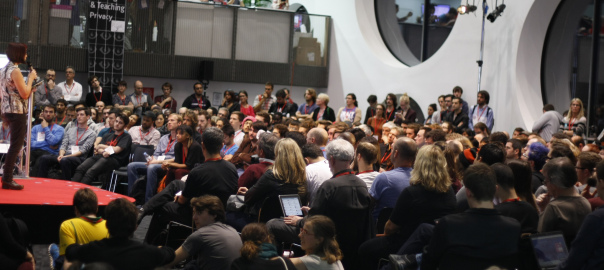MozFest was huge (1500+ attendees), spanned 9 floors and had at least 16 concurrent tracks running at any given time. That’s without all the additional community areas showing their projects and the future of open society.
Based on a number of other similar events I attended and helped organised in the past (BarCamps, CCC) here are the basics, with most important at the beginning.
Keep track of your Water and Food intake
It’s surprisingly easy to get dehydrated if you’re out of your normal everyday comfort zone. You get distracted by people and talks, so make sure you start a day with a water bottle, provided by the organisers or just 0.5L bottle that you can refill. I’m in a habit that I always go to refill it once it’s empty.
Most importantly, avoid sugar and coffee (and run away from Club Mate). You probably don’t eat a Mars bar during the day and drink 4 latte’s so you probably won’t even recognise when your body crashed. But you’ll be cranky and won’t be able to enjoy the event. If you normally drink coffee or tea, try to drink only as much as you would on a normal day in the office.
To fix the problem of not running on sugary things, try to figure out how to eat the 5 – 6 meals during the conference day. The problem here is that croissant or a similar pastry doesn’t help since it’s too sugary and you will once again crash. For MozFest I’ve looked up closest store that was open that day and bought myself a mix of nuts and a sandwich. Don’t relay on organisers that they will be able to provide food that will make sense under such conditions (avoiding sugar). It’s more or less impossible at that scale, without exploding the costs of catering.
App Idea: preset the times and it will buzz your phone so you don’t forget to drink and eat.
Figure out ahead of time when you’re going to take your break
Events are super exciting, but you’re not doing yourself a service if you’re tired and unfocused. The more events I go to, the more I’m happy with hearing just 2 or 3 good talks a day or even with just a few good chats with new friends.
So if I discover that nothing super interest me, I will rather find a quieter spot and disconnect a bit from all the noise and people. It’s also a great opportunity to find a quick snack somewhere near the venue.
Read the Schedule and talk to Regulars
I’m not sure why, but getting a super big schedule often means I don’t invest the time to properly study it. Which always turns out to be a big mistake as I don’t have a good idea about what I really want to hear about. This is a bit easier with smaller one or two track events.
I often go to events alone as I’m trying to visit new communities that are outside of my regular professional work. Whenever I manage to befriend a Regular conference attendee they could quickly tell me who are the speakers that are consistently giving the best talk, even if it doesn’t seem so from the talk description.
Meet new people by being easy to approach
I love my geek t-shirts. The ones with logos from the Programming languages and environments that I work with. It makes it easy to let others know what you’re interested to know and it’s a perfect conversation starter for both. Remember to compliment the Fizzbuzz 0.5x.3 release T-Shirt of a fellow attendee.
If you’re a part of a smaller group and you have something to contribute, do that and/or ask your questions. You will let a wider group of people know what you’re interested about, you’re share something useful and there’s a high chance that after the session ends, some of them will want to talk to you.
Don’t overdo it
I keep trying to do too many things. Be at the venue for the first talk go to sessions and visit the after party. Depending on the venue and party, I’ve started opting for a proper dinner and a full nights sleep instead of trying to shout at people and at a loud venue.
This are the five basics that I always get at least one wrong. So they’re not as obvious as they seem.
Tell me what I missed, but keeps you running at events?

Great post. Another thing that dehydrates is alcohol and this is not the only reason why it is better to drink it in evening, at a party after main event (serving alcohol also closes event from younger attendees which sucks).
My diet is uncommon enough that I usually can’t rely on organizer’s catering so I either bring something with me or figure out where I will go to fetch my food in case I need to. I rarely eat at events.
Eleanor Roosevelt supposedly said: “Great minds discuss ideas; average minds discuss events; small minds discuss people.” At conferences I try to figure out what kind of talk I am dealing with. I prefer those that discuss mental models and general approach behind tool to solving problems. Temporary feature advantages are rarely interesting or important enough to skip just reading the website.